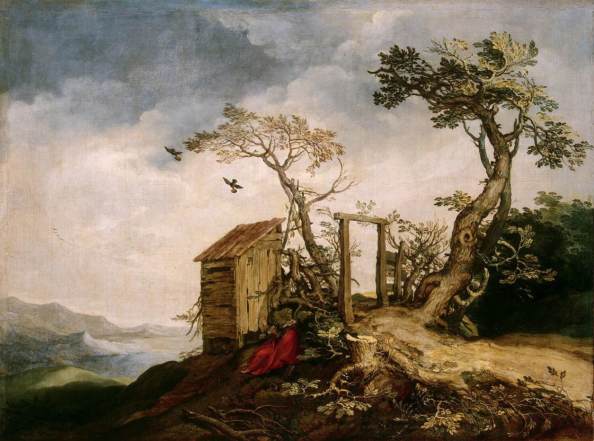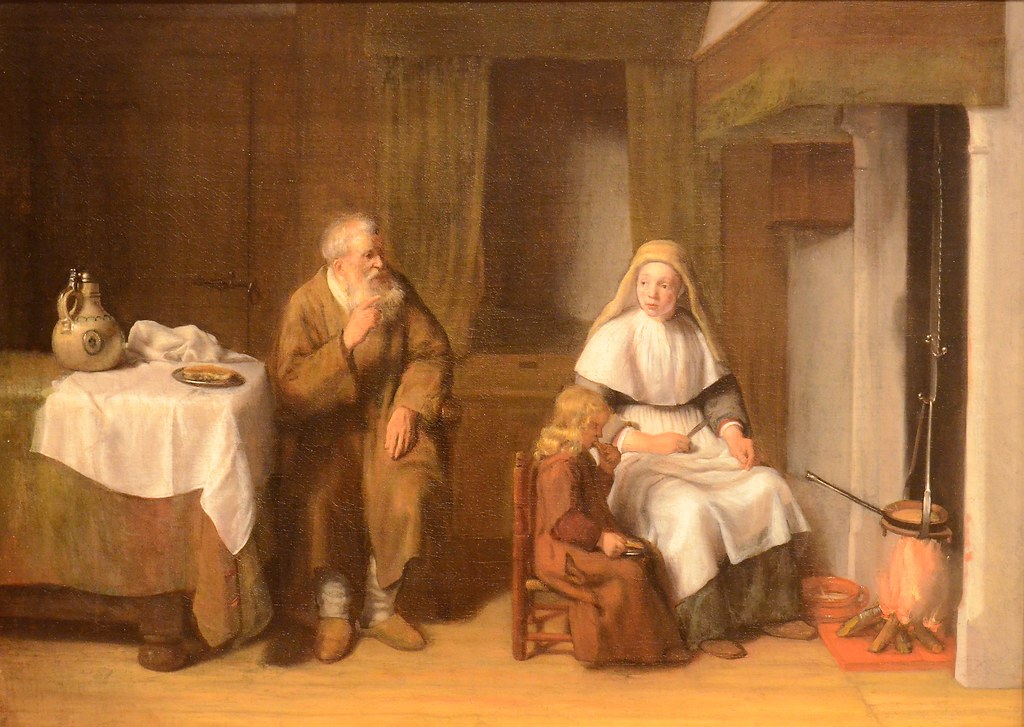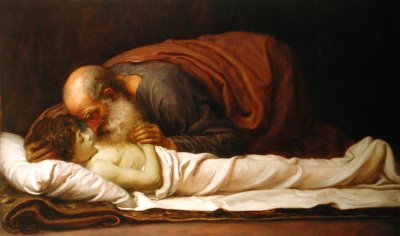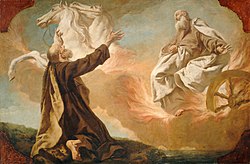
Scenes from the Life of Elijah Jorg Ratgeb
Today is a special Feast Day of Elijah who is considered an exemplar and spiritual founder of the Carmelite Order, along with Our Lady. His name means "My God is Yahweh", and his life was a constant reflection of this truth, and his dedication even amidst peril and extreme challenges. This Feast Day is a hidden celebration, unknown by most in the Church, which is somewhat appropriate for this larger than life Old Testament prophet who nonetheless found himself living a hidden life in between active obedience to the various missions that God called him to undertake. Such oases of seclusion was where Elijah drank from the stream of quiet contemplation, listened for the subtle whispers of the Spirit, and was fed and nourished by angels and ravens to assist Elijah in fulfilling his higher calling from God.
Just as a reminder, I am providing a brief summary of this very dramatic Prophet's life, and the primary events that happened on his watch.
Elijah was chosen by God to be the prophet of Israel during the reign of King Ahab (874-853 BC). During this time, King Ahab married Jezebel and built a temple to the false god of Baal. Elijah is sent to the king and predicts a drought to plague the nation for 7 years as a result of his disobedience and unfaithfulness. Elijah is able to escape the king and queen's wrath, and is instructed by God to go to hide himself in the Wadi Cherith or stream near the Jordan where he is promised that ravens will feed him. After the stream runs dry, Elijah finds himself in Zerephath where he meets a widow and asks her to share her food. She states that she is making her last flour cakes with the oil and flour she has, and then is prepared to die with her son of starvation. Elijah promises God's protection and provision for her if she will share, which she does, and her foodstuffs are multiplied during the famine and drought. A while after inviting Elijah into their home, the widow's son dies. She laments having ever met Elijah, but the Prophet lays his body down upon him in a profound posture of prayer, and the boy revives.
The third year of the drought, Elijah meets King Ahab's army face to face on Mt. Carmel and challenges his false prophets of Baal to the one true God. Both build altars, but the gods of Baal take no action in consuming the sacrifice and offering upon it. Elijah pours water upon the altar of God, and all are stunned and amazed that the Lord consumes his offering in a dramatic fire from heaven. The people recognize the one true God and lament their errors. Elijah is instructed by God to slay all of the false prophets and worshipers of Baal. After this mighty battle, Elijah predicts rain and sends a servant to the top of Mt. Carmel to look for clouds. On the 7th attempt, he reports seeing a tiny cloud "as small as a man's hand rising from the sea." Elijah recognizes this as the Virgin Mary who will give birth to the Messiah (1 Kings 18:41-46).
Jezebel is quite perturbed by the slaughter of her false prophets and warns Elijah she is going to kill him. Elijah escapes to a broom tree in despair, but is approached by an angel who orders him to get up and eat for strength for the journey. He walks 40 days and nights to Mount Horeb. Once there, Elijah finds himself in a cave in prayer. God asks him, "Why are you here?" Elijah answers, "I have been most zealous for the Lord God of hosts, but the Israelites seek to take my life." (1 Kings 19:11-18) God tells Elijah to go to the mouth of the cave and to listen as He passes by. He doesn't hear God in the thunder, nor the earthquake, but in the tiny whispering sound of the wind, at which point Elijah covers his face.
Elijah lives out the rest of his days in prayer. He meets Elisha and places his cloak upon him as his successor. When he is about to die, Elisha asks for a double portion of Elijah's spirit. It is granted to him and he watches as Elijah is taken up to heaven in a flaming chariot and horses near Mt. Carmel. This was said to be the beginning of the school of the prophets of Carmel. We are also told that Elijah will return at the end of time, "to appease the wrath of the Lord, to reconcile the heart of the father to the son and to restore the tribes of Jacob." (Ecclesiasticus 48: 9-10)
Whew! What a life he led! These various periods of prayer and rest, punctuated with active work for God's Glory is a rich well of meditations and considerations for our own journeys (although probably not as intensely colorful and filled with miracles, missionary movement, and physical danger). His surrender to being used as a mouthpiece for God and a pawn in His Kingdom and for His Glory speaks volumes concerning the seasons of the soul, the spiritual wealth of seeming victory as well as defeat, and the ebb and flow of God's movements within us.

Landscape with the Prophet Elijah in the Desert BLOEMEART (1610’s)
REFLECTIONS:
1. Do I obediently seek shelter from the world and its busyness, when the Holy Spirit summons me out into the desert to speak to my heart or do I insist on staying occupied with earthly matters and ignore the voice of God due to fear, attachment, or pride?
2. Do I allow God to feed me at the Eucharistic Table with his Precious Body and Blood or do I ignore the power and strength found only in the Sacraments and Holy Mass?
3. Do I trust in God's Divine Providence for me and that He will provide for my needs?
4. Do I find time to be alone with the alone and to ponder and listen in silence?
5. Do I recognize God's Presence in all of Creation and its beauty? Do I treat all human life with respect and dignity, as well as protect the environment and all in creation?

Elijah with the Widow and Son
REFLECTIONS:
1. Do I ask for the help of others when I am in need or do I try to handle it myself, and thus further my self-sufficiency and pride?
2. Do I share what I have with others in need, especially the poor, the widowed and orphaned?
3. Do I trust and have confidence in God's Divine Provision and always count my blessings, even in times of hardship and seemingly impossible situations?

REFLECTIONS:
1. Do I stretch myself and give all I have to others when they are in dire need?
2. Do I pray for others' healing and pour out my heart and prayer to them in times of severe trial?
3. Do I pray to God without ceasing thereby making my entire life a prayer in allegiance to
Jesus Christ through the intercession and example of Our Lady?
4.Do I exercise faith that myself and others will receive what they need when I seek God in prayer and persist in prayer?

Offering of Elijah CHAGALL (1956)
REFLECTIONS:
1. Do I exhibit courage when faced with heresies or blasphemies against God, the Church, and Her teachings? If I am not called to speak directly, do I at least take all of these needs to prayer and pray in a spirit of reparation asking for Jesus' Divine Mercy for the whole world?
2. Does my example show others that I am a Christian? Do I participate in things that are not holy or put into question my moral beliefs and values?
3. Am I attached to any false idols such as money, prestige, power, vanity, other persons, sensual pleasures, substances/addictions, etc?
4.Do I seek reconciliation with God in the sacrament of Confession on a regular basis in order to grow in sanctity and rid myself of faults and venial and/or mortal sins?

Elijah Taken Up in a Chariot of Fire by Giuseppe Angeli (1780)
REFLECTIONS:
1. Do I have trust that Our Lord has a plan for my life and those of my loved ones, and all happens according to His Most Perfect Will when we are walking with Him?
2. Do I fear death or do I understand that it is a passage to new life for believers? What other fears do I have? Meditate on "Perfect love casts out all fear." 1Jn 4:18
3. Do I believe in His goodness and Divine Mercy for me and for all of humanity, and that all have the opportunity to choose Him and His love?
I am hopeful that these reflection questions inspired by the adventures of the Prophet of Elijah can assist all of us as we seek closer conformity in doing His Divine Will in the spirit of the Tishbite we celebrate today.
St. Elijah...Pray for us...